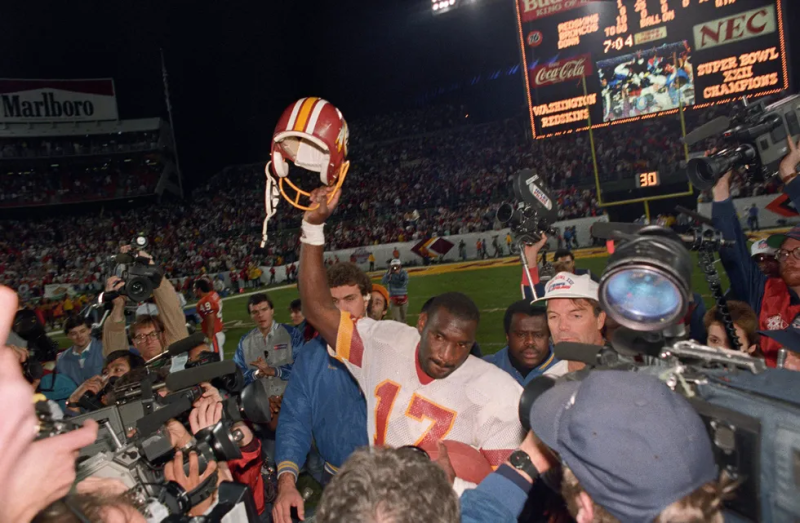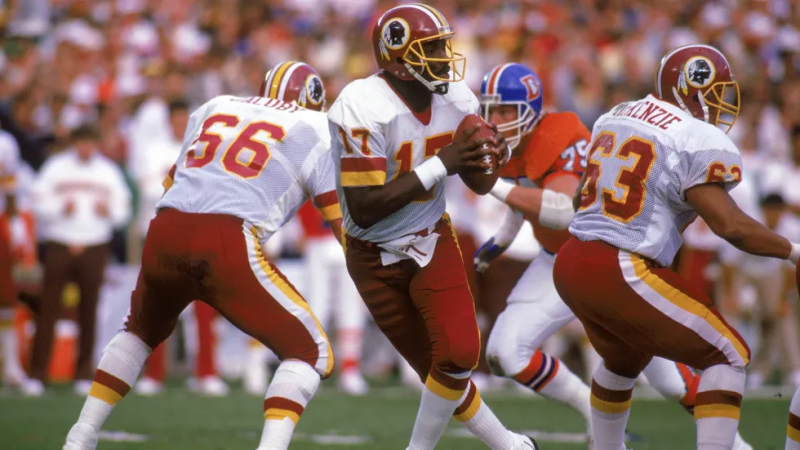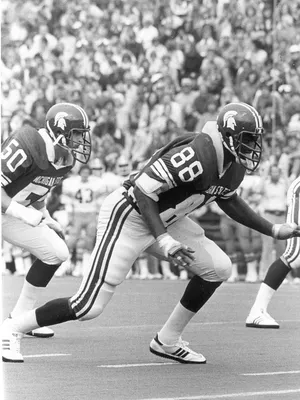Doug Williams' magical moment in Super Bowl XXII still resonates. 'Every single day.'
Editor's note: We see the joy in sports all year. This seven-part series was created to share some of the memorable, happy, heartfelt and inspiring moments from USA TODAY's reporters and columnists.
It has been nearly 36 years since Doug Williams became the first Black quarterback to start and win a Super Bowl. Yet even now the former Washington signal-caller keeps learning more about the history that happened with Super Bowl XXII on Jan. 31, 1988.
How often does Williams meet people, usually Black people, eager to share their memory?
“Every single day,” Williams told USA TODAY Sports. “No matter where I go, when I travel, whenever I go out in public, somebody will tell me where they were.
“When I was in L.A. over the weekend, a guy told me that he had to watch it two days later because he was in the Persian Gulf, serving in the military. It’s stuff like that.
NFL STATS CENTRAL: The latest NFL scores, schedules, odds, stats and more.
“Somebody else told me that his mom didn’t know a thing about football, but she was praying hard on that day.”
Well, Doug, that historic moment was rather significant for me, too – for an extremely personal reason – as I was so blessed to witness it from the press box at Jack Murphy Stadium in San Diego.
Super Bowl XXII came at the end of the 1987 season that encased the most traumatic year of my life.

At the time, I was 27, working for the Dallas Cowboys Weekly and grieving the loss of my first cousin, Larry Bethea, the former first-round pick of the Cowboys who helped me land a freelance writing job with the team’s newspaper after I graduated from Michigan State in 1981.
In April 1987, Bethea died by suicide with a gunshot to the head. It left me devastated, as so many suicide survivors can attest, forced to process a particular kind of death. In my case, it came with the challenge of working in an environment that once included my cousin.
For months, drained by depression, I barely spoke to anyone beyond what was necessary to complete my daily tasks. It was pretty much my own version of a “Silent Season.” To this day, I am so grateful for the compassion and support from so many people throughout the organization, including former teammates of Bethea who played for the Cowboys. I particularly remember how Ed “Too Tall” Jones and the PR man, Greg Aiello, routinely checked on me.
As the season wound down (which was a terrible campaign for Tom Landry’s team), my editor, Carlton Stowers, asked if I’d be interested in covering my first Super Bowl. As I mentioned to Stowers last week, my instincts suggested that the plum assignment was an effort to cheer me up. He doesn’t deny that. At the time, he presented it as an opportunity to learn the lay of the land during Super Bowl week, which I’ve since handled in covering 33 Super Bowls.
Little did I realize that I was signing up for history with Super Bowl XXII – which also provided the opportunity to get out of my personal funk and revitalize all that I was trying to develop in my career.
It’s also striking that in the years since, in chronicling the twists and turns of his journey, I’ve had the pleasure of developing a professional relationship with Williams, 68, who now serves as a special advisor for the Washington Commanders. He’s remained close to the game, primarily in personnel, yet also with a stint as head coach at his alma mater, Grambling.
Ironically, Williams was drafted in that same first round with Bethea in 1978. Williams was selected 17th overall by the Tampa Bay Buccaneers. Ozzie Newsome, by the way, was chosen 23rd by the Cleveland Browns. James Lofton was picked sixth by the Green Bay Packers. And Earl Campbell, the Texas legend, was the top pick.
Bethea, the Big Ten’s MVP, was the D-lineman drafted 28th by the Cowboys, the last selection in the first round. I’ll never forget being in his Spartan Village apartment on draft day, telling Cowboys VP Gil Brandt in a phone call that he didn’t need to do a press conference because: “I don’t play for the media.” In any event, Bethea did so much for me to even wind up in college, then a few years later opened a door for me to start my career in Dallas.

Williams, meanwhile, is simply Black Royalty. On the scale of social significance, his magnificent moment – which included passing for a then-record 340 yards and garnering Super Bowl MVP honors – represented for Black people something like the tumbling of the Berlin Wall.
For decades, Blacks players were overwhelmingly denied opportunities to play quarterback in the NFL against the backdrop of racist stereotypes. Most were switched to other positions when coming out of college. Warren Moon, now a Hall of Famer, had to play several years in Canada before getting a shot in the NFL. Quarterback was long considered a “thinking man’s position” in the NFL, which seems so absurd now when you see Patrick Mahomes or Lamar Jackson performing magic on any given Sunday with their arms, legs -- and minds.
The narrative changed in a huge way with Williams, which is why the pride that Black people – even those who didn’t follow football – felt with his moment was so authentic. Williams goes down with the likes of Jesse Owens, Jackie Robinson, Wilma Rudolph and Muhammad Ali as an ultimate game-changer.
He inspired future generations, which is why it was so cool to see Mahomes and Jalen Hurts pay homage to Williams in February, embracing history as they became the first pair of Black quarterbacks to face off in a Super Bowl.
“I think about the guys before me who were denied,” Williams said. “If they were doing stuff the right way before me, I might not have been that first one.”
Ah, the first one. For someone who has covered over 1,000 NFL games over 42 years, there is still no game that resonates with me quite like Super Bowl XXII – for myriad reasons.
A few years ago, I ran into Williams in the press box in Charlotte, where he was on a scouting mission. I told him that the day after Super Bowl XXII, when the prices for souvenirs were slashed, I paid $5 for a brass key chain that looked like a ticket. All these years later, my keys are still on that chain.

I offered to give the key chain to Williams. And he laughed.
He told me something like, “I’ve got one of those. You wouldn’t believe all the stuff I’ve got from that Super Bowl.”
So, I kept my brass key chain. And it has stood the test of time as a functioning piece of equipment.
Speaking of souvenirs that marked the moment, it was cool, too, the day after Super Bowl XXII to be on the same flight back to Dallas with Eddie Robinson, the legend who coached Williams at Grambling. I can still see the huge smile that Robinson wore as he essentially floated down the aisle of the airplane. He obviously beamed with so much pride for what his pupil had achieved. And Robinson, as I recall, was also hauling bags with a trove of souvenirs.
He knew. The history was worth being savored.
Williams knows, too. As he put it to me this week, “You look at what politics have created. People are trying to erase history.”
Williams’ historic moment, though, will never be erased. And that, too, represents some serious joy.
Disclaimer: The copyright of this article belongs to the original author. Reposting this article is solely for the purpose of information dissemination and does not constitute any investment advice. If there is any infringement, please contact us immediately. We will make corrections or deletions as necessary. Thank you.






